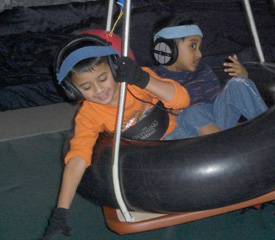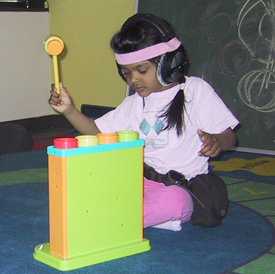If you suspect your child has disordered Sensory Processing (SPD), if he or she has already been diagnosed, or if you are an adult seeking a sensory evaluation or treatment, you will need to locate a qualified occupational therapist (OT). Depending on the diagnosis, you may also work with a pediatric speech-language pathologist, physical therapist, or other health care professional.
What to look for in an occupational therapist
Finding and selecting an occupational therapist to help your child, yourself, and/or your family is an important decision. Like all professionals, OTs differ in training, philosophy, and personality. The best choice is an OT who is a good "fit" for your child and yourself – someone you and/or your child likes and with whom you feel connected.
You will also want to look for an OT who follows methods known to be associated with effective treatment. These include:
- Provides direct 1-to-1 treatment in a sensory-rich setting that has unique equipment that provides a wide range of sensory opportunities
- Includes a diagnostic evaluation before you begin treatment and delivers it in
 easily understandable, written form. (If there are sections with jargon that you don't understand, ask for an explanation before agreeing to treatment.)
easily understandable, written form. (If there are sections with jargon that you don't understand, ask for an explanation before agreeing to treatment.) - Makes parent education an integral part of the treatment program, and we don't mean five minutes at the end of a treatment session! Parents need and deserve much more than that! Several dedicated hours for parent feedback and education should be built into the treatment plan.
- Provides written goals for treatment before you begin treatment to assure that everyone is "on the same page" about priorities
- Documents changes with post-treatment testing so everyone knows how treatment is working. Typically, OTs who provide excellent pre-treatment testing also provide good post-treatment testing.
- Provides intensive treatment (at least twice times a week and preferably three) over a shorter time duration rather than once-a-week treatment. Weekly treatment can produce behavior changes, but research suggests that intensive treatment produces lasting neurological changes as well as changes in behavior.
- Uses play and success to produce change and foster self-esteem. In good, sensory-based OT, children think they are playing. If a child is crying during treatment sessions, the OT may not be skilled in providing challenge with success, which is a keystone to treatment effectiveness.
- Uses purposeful sensory stimulation to work on "occupations" such as eating, dressing, playing with others, social participation, self-regulation, and self-esteem.
- Asks questions that will lead to effective understanding of you, your child, and your family. Don't be afraid to ask questions yourself either! If you don't understand what your OT is doing, it is crucial to confirm that his or her methods and activities are grounded in sound therapeutic concepts and part of a well-defined strategy. If the therapist cannot clearly answer your questions, it may be a red flag that he or she lacks the training or understanding to provide effective intervention.
- Listens to you, believes you, and fully believes in the potential of your child to change. The outcomes of OT are functional changes – differences that you, your child's teacher, and others can see. If you can't tell if your child is improving, he or she is not improving enough!
If your child qualifies for special education, you may be able to arrange for him or her to receive occupational therapy in school.
Questions to ask a prospective therapist
Not all occupational therapists are trained to work with children who have Sensory Processing Disorder. When you find a therapist you might want to work with, asking the following questions will help you to decide if he or she is right for you and your child:
 Are you a certified as an occupational therapist by the National Board of Certification in Occupational Therapy?
Are you a certified as an occupational therapist by the National Board of Certification in Occupational Therapy?- Do you have any specific training in assessing and treating children with Sensory Processing Disorder? What form did that training take (e.g., graduate school, professional seminars)?
- Have you been mentored by an expert in OT with a sensory integration approach?
- How much experience do you have in working with children with developmental problems and/or with Sensory Processing Disorder?
- Are you trained or certified in the use of any standardized diagnostic tools that are used to assess children who might have Sensory Processing Disorder?
Beyond the Treatment Directory
If the Treatment Directory does not include an occupational therapist (OT) near where you leave and/or you wish to learn about additional providers, the following strategies may prove helpful.
- Call your local hospital and ask to speak with someone in the occupational therapy department or the rehabilitation unit.
- Call or email an occupational therapy program at a university near you and ask to talk with a faculty member who teaches pediatrics or SPD treatment or assessment. You can find an accredited university program at the American Occupational Therapy Association's (AOTA) web site. (On the AOTA home page, click "Academic Affairs & Accreditation," then "Educational Programs").
- Check the AOTA web site for the AOTA Specialist Directory and the list of state Occupational Therapy Associations. (At the AOTA home page, click on "Consumers" and then on "Find an Occupational Therapist").
There are many parts of the country and the world where no OTs with appropriate sensory-based training are available. If that is true for you or your family, these are strategies for treatment you may consider:
- Select an OT with less sensory training but who is otherwise a good fit.
- Find a professional in another field, such as physical therapy or speech/language pathology, who has some sensory training.
- Travel to a location such as the STAR Institute Treatment Center in Denver or another treatment site where intensive treatment is offered for out-of-town clients.
If you are working with a therapist who wishes to obtain more advanced training in OT with a sensory integration approach, you can refer him or her to the STAR Institute’s Advanced Intensive Mentorship program, where we provide a one-week training program in assessment and treatment.
